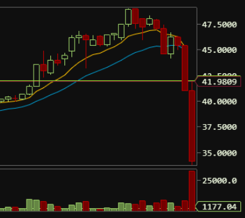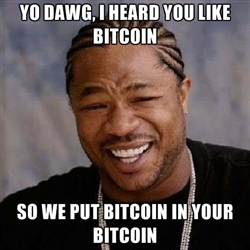With Bitcoin enjoying a spike in price against government currencies, there is lots of talk about it on the Interwebs, including Jerry’s typically thoughtful post from earlier today. If you’re not familiar with it yet, here’s a good Bitcoin primer, which also counsels reading a lot more before you acquire Bitcoin, as Bitcoin may fail. If you like Bitcoin and want to buy some, don’t go all goofy. Do your homework. As if you need to be told, be careful with your money.
Much of the commentary in the popular press declares a Bitcoin bubble for one reason or another. It might be a bubble, but nobody actually knows. A way of guessing is to compare Bitcoin’s qualities as a currency and payment network to the alternatives. Like any service or good, there are many dimensions to value storage and transfer.
I may not capture them all, and they certainly don’t predict the correct price against the dollar or other currencies. That depends on the ultimate viscosity of Bitcoin. But Bitcoin certainly has value of a different kind: it may discipline fiat currencies and the states that control them.
Intrinsic Value: If you’re just starting to think about money, this is where you’ll find Bitcoin an obvious failure. These evanescent strings of code have no intrinsic value whatsoever! Anyone relying on them as a store of value is a volunteer victim. Smart people stick with U.S. dollars and other major currencies, thin sheets of cloth or plastic with special printing on them…
No major currency has intrinsic value. Indeed, there isn’t much of anything that has intrinsic value. The value of a thing depends on other people’s demand for it. This is as true of Bitcoin as it is of dollars, sandwiches, and sand. So the intrinsic value question, which seems to cut in favor of traditional currencies, is actually a wash.
Transferability: Bitcoin is good with transferability–far better than any physical currency and quite a bit better than most payment systems. Not only is it fast, with transactions “settling” fairly quickly, but it is borderless. The genius of PayPal (after it gave up on being a replacement monetary system itself) was quick transfer to most places that rich people want to send money. Bitcoin allows quick transfer anywhere the Internet goes.
Acceptance: Bitcoin bombs badly in the area of acceptance. Try buying a sandwich with Bitcoin today and you’ll go hungry because few people and businesses accept it. This is a real problem, but it’s nothing intrinsic to Bitcoin. When Hank Aaron broke Babe Ruth’s home run record, people didn’t understand that credit cards were like money. (Watch the video at the link two or three times if you need to. It’s not only a great moment in sports.) Acceptance of different form-factors for value and payments can change.
Cost: How many billions of dollars per year do we pay for storage and transfer of money? Bitcoin is free.
Inflation-Resistance: Assuming the algorithms work as advertised, the quantity of Bitcoin will rise to a pre-established level of about 21 million over the next couple of decades and will never increase after that. This compares favorably to fiat currencies, the quantity of which are amended by their managers, sometimes quite dramatically, to undercut their value. If you want to hold money, holding Bitcoin is a better deal than holding dollars. Which brings us to…
Deflation-Resistance: Without central planners around to carefully debase its value, Bitcoin might go deflationary, with people refusing to spend it while it rises against all other stores of value and goods. Arguably, that’s what’s happening in the current Bitcoin price-spike. People are buying it in anticipation of its future increase in value.
Deflation can theoretically cause an economy to seize up, with everyone refusing to buy in anticipation of their money gaining in value over the short term. There is room for discussion about whether hyper-deflation can actually occur, how long a hyper-deflation can persist, and whether the avoidance of deflation is worth the risk of having centrally managed currency. I have a hard time being concerned that excessive savings could occur. However, whatever the case with those related issues, Bitcoin is probably deflation-prone compared to dollars and other managed currencies.
Surveillance-Resistance: Where you put your money is a reflection of your values. Payment systems and governments today are definitely gawking through that window into our souls.
Bitcoin, on the other hand, allows payments to be made with very little chance of their being tracked. I say “little chance” because there is some chance of tracking payments on the network. Sophisticated efforts to mask payments will be met by sophisticated efforts to track them. Relatively speaking, though, payments through traditional payment systems like checks, credit cards, and online transfer are super-easy to track. Cash is pretty darn hard to track. So Bitcoin stacks up well against our formal payment systems, but equally or perhaps poorly to cash.
Seizure-Resistance: The digital, distributed nature of Bitcoin makes it resistant to official seizure. Are you in a country that exercises capital controls? (What a euphemism, “capital controls.” It’s seizure.) Put your money into Bitcoin and you can email it to yourself. Carve your Bitcoin code into the inner lip of your frisbee before heading out on that Black Sea vacation. Chances are they won’t catch it at the border.
Traditional currencies either exist in physical form or they’re held and transferred by institutions that are more obediant to the state than they are loyal to their customers. (If Cyprus has anything to do with the current price-spike of Bitcoin, it’s as a lesson to others. Cypriots apparently did not move into Bitcoin in significant numbers.)
Because Bitcoin transactions are relatively hard to track, many can be conducted–how to put this?–independent of one’s tax obligations. In relation to the weight of the tax burden, Bitcoin may grow underground economies. Indeed, it flourishes where transactions (in drugs, for example) are outright illegal. Bitcoin probably moves the Laffer curve to the left.
Security: The tough one for Bitcoin is security. Most people don’t know how to store computer code reliably and how to prevent others from accessing it. Individuals have lost Bitcoin because of hard-drive crashes. (This will cause small losses in the total quantity of Bitcoin over time.) Bitcoin exchanges have collapsed because hackers broke in. And there’s a genuine risk that viruses might camp on your computer, waiting for you to open your (otherwise encrypted) wallet file. They’ll send your Bitcoin to heaven-knows-where the moment you do.
When a Bitcoin transaction has happened, it is final. Like a cash expenditure or loss, there is no reversability and nobody to complain to if you don’t have access to the person on the other side of the transaction. The downside of a currency that costs nothing to transfer is the lack of a 1-800 number to call.
So Bitcoin lags traditional currencies along the security dimension. But this is not intrinsic to Bitcoin. Security will get better as people learn and technology advances. (How ’bout a mega-firewall that requires approval of all outbound Internet traffic while the wallet is open?)
There may be Bitcoin-based payment services, banks, and lenders that provide reversibility, security, that pay interest, and all the other goodies associated with dollars today. To the extent they can stay clear of the regulatory morass, they may be less expensive, more innovative, and, in the early going, more risky.
So what’s the right price for Bitcoin? Only a fool can say. (No offense, all of you declaring a Bitcoin bubble.) I think it depends on the ultimate “viscosity” of Bitcoin.
Let’s say Bitcoin’s exclusive use becomes a momentary medium of exchange: Every buyer converts currency to Bitcoin for transfer, and every seller immediately converts it to her local currency. There’s not much need to hold Bitcoin, so there’s not that much demand for Bitcoin. Its equilibrium price ends up pretty low.
On the other hand, say everybody in the world keeps a little Bitcoin on hand for quick, costless transactions once there’s a handy, reliable, and secure Bitcoin payment system downloadable to our phones. If lots of people hold Bitcoin just because, that highly viscous environment suggests a high price for Bitcoin relative to other currencies and things.
Whatever the case, people are now buying Bitcoin because they think others are going to buy it in the future. Whether they’re “speculators” trying to buy in ahead of other speculators, or if they’re buying Bitcoin as a hedge against the varied weaknesses of fiat currencies and state-controlled payment systems, it doesn’t matter.
What does matter, I think, is having this outlet. The availability of Bitcoin is a small, but growing and important security against fiat currencies and state-controlled payments. It is a competitor to state money.
Bitcoin’s existence makes central bankers slightly less free to inflate the money they control, states will have slightly less success with seizing money, and surveillance of traditional payment systems will be decreasingly useful for law enforcement, taxation, and control.
I don’t think Bitcoin delivers us to libertarian “Shangri-la” or anarcho-capitalism, but it’s a technology that fetters government some. It’s a protection for people, their hard-earned wealth, and their privacy. That’s the value of Bitcoin, in my mind, no matter its current price.

 A couple of weeks ago I wrote that
A couple of weeks ago I wrote that  The mid-to-late 90s saw the crypto wars, probably the Internet’s first major victory against government attempts to control information online. At stake was the public’s right to use strong encryption, which facilitates commerce and allows individuals to maintains their personal privacy, but which government feared would allow “drug lords, spies, terrorists and even violent gangs to communicate about their crimes and their conspiracies with impunity,” as FBI Director Louis Freeh told the Senate Judiciary Committee in 1997. In the end, popular opinion overwhelmed government efforts to include back doors in publicly available encryption, which might as well have been no encryption at all.
The mid-to-late 90s saw the crypto wars, probably the Internet’s first major victory against government attempts to control information online. At stake was the public’s right to use strong encryption, which facilitates commerce and allows individuals to maintains their personal privacy, but which government feared would allow “drug lords, spies, terrorists and even violent gangs to communicate about their crimes and their conspiracies with impunity,” as FBI Director Louis Freeh told the Senate Judiciary Committee in 1997. In the end, popular opinion overwhelmed government efforts to include back doors in publicly available encryption, which might as well have been no encryption at all. Over the past few days, interest in bitcoin has exploded as its valuation has reached stratospheric levels. Most of the media attention has been focused on that valuation and on bitcoin’s viability as money. For example, the Financial Times had the run-up in bitcoin’s price on its
Over the past few days, interest in bitcoin has exploded as its valuation has reached stratospheric levels. Most of the media attention has been focused on that valuation and on bitcoin’s viability as money. For example, the Financial Times had the run-up in bitcoin’s price on its  The Technology Liberation Front is the tech policy blog dedicated to keeping politicians' hands off the 'net and everything else related to technology.
The Technology Liberation Front is the tech policy blog dedicated to keeping politicians' hands off the 'net and everything else related to technology.